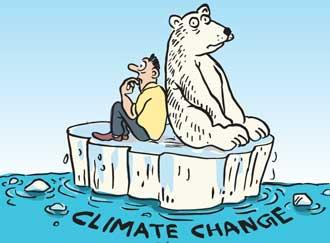Reply To:
Name - Reply Comment
 With about 200,000 people across 17 districts being affected by the Deep Depression in the Bay of Bengal, the government is moving fast to provide relief to them but in the aftermath, President Anura Kumara Dissanayake and the National People’s Power(NPP) government need to also look at the root causes of such a catastrophe. Clearly, one of the main reasons is the failure to effectively control climate change and we hope the government will give highest priority to measures to prevent this.
With about 200,000 people across 17 districts being affected by the Deep Depression in the Bay of Bengal, the government is moving fast to provide relief to them but in the aftermath, President Anura Kumara Dissanayake and the National People’s Power(NPP) government need to also look at the root causes of such a catastrophe. Clearly, one of the main reasons is the failure to effectively control climate change and we hope the government will give highest priority to measures to prevent this.
According to the Partnership for Maternal, Newborn and Child Health (PMNCH), the International Day of Climate Action is celebrated on October 24, and is dedicated to raising awareness about the urgent need to address climate change. People come together to highlight the importance of environmental conservation, promote sustainable practices, and advocate policies that address climate issues.
In Sri Lanka, the new government has pledged to implement several measures including the more extensive use of solar and wind power, promote the use of electric vehicles and other eco-friendly steps. As responsible citizens, we also should take some eco-friendly steps by using public transport whenever possible, planting trees and participate in clean-up campaigns.
According to a statement issued by the United Nations Framework Convention on Climate Change (UNFCCC), the Paris Agreement is a legally binding international treaty on climate change. It was adopted by 196 Parties at the UN Climate Change Conference (COP21) in Paris, France, on December 12 2015. It entered into force on November 4 2016.Its overarching goal is to hold ‘the increase in the global average temperature to well below 2°C above pre-industrial levels’ and pursue efforts ‘to limit the temperature increase to 1.5°C above pre-industrial levels’. However, in recent years, world leaders have stressed the need to limit global warming to 1.5°C by the end of this century. That’s because the UN’s Intergovernmental Panel on Climate Change indicates that crossing the 1.5°C threshold risks unleashing far more severe climate change impacts, including more frequent and severe droughts, heat waves and rainfall.To limit global warming to 1.5°C, greenhouse gas emissions must peak before 2025 at the latest and decline 43% by 2030. The Paris Agreement is a landmark in the multilateral climate change process because, for the first time, a binding agreement brings all nations together to combat climate change and adapt to its effects, the statement says.
UNFCCC further says the Implementation of the Paris Agreement requires economic and social transformation, based on the best available science. The Paris Agreement works on a five-year cycle of increasingly ambitious climate action or, ratcheting up, carried out by countries. Since 2020, countries have been submitting their national climate action plans, known as nationally determined contributions (NDCs). Each successive NDC is meant to reflect an increasingly higher degree of ambition compared to the previous version. Recognising that accelerated action is required to limit global warming to 1.5°C, the COP27 cover decision requests Parties to revisit and strengthen the 2030 targets in their NDCs to align with the Paris Agreement temperature goal by the end of 2023, taking into account different national circumstances.In their NDCs, countries communicate actions they will take to reduce their greenhouse gas emissions to reach the goals of the Paris Agreement. Countries also communicate in their NDCs actions they will take to build resilience to adapt to the impacts of climate change.To better frame the efforts towards the long-term goal, the Paris Agreement invites countries to formulate and submit long-term low greenhouse gas emission development strategies (LT-LEDS).
LT-LEDS provide the long-term horizon to the NDCs. Unlike NDCs, they are not mandatory. Nevertheless, they place the NDCs into the context of countries’ long-term planning and development priorities, providing a vision and direction for future development.
According to the United States former President Barack Obama, the first colored President, “The world must come together to confront climate change. There is little scientific dispute that if we do nothing, we will face more drought, famine and mass displacement that will fuel more conflict for decades.”